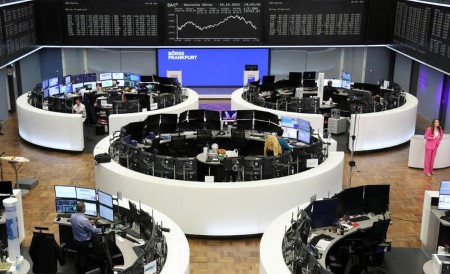




Inflation Update: Green light for easing
 DOWNLOAD
DOWNLOAD

December Economic Update: One for them, one for us
 DOWNLOAD
DOWNLOAD

Philippines Trade Update: Trade trajectories trend along
 DOWNLOAD
DOWNLOAD


Stocks struggle over China growth concerns

Oct 25 (Reuters) – Emerging market stayed at 2-1/2-year lows on Tuesday as Asian shares continued to struggle over policy worries under Xi Jinping’s third presidential term, while Hungary’s forint looked to a central bank policy decision due later in the day.
The broader emerging market currencies index was at near 2-1/2-year lows as the Chinese yuan was at January 2008 lows against the dollar. The offshore yuan slipped further into record low territory.
China stocks, which plunged on Monday on worries that Xi’s appointment of loyalists to his leadership team could mean prioritising the state over growth, were flat to lower.
“Further growth in China cannot be based on foreign trade, but rather on deepening its domestic market. The key question is whether the political regime facilitates this. It seems legitimate to harbour some doubts in this regard,” said economists Bruno Cavalier and Fabien Bossy at ODDO BHF.
“With the evaporation of the booster effect of unbridled residential construction, China’s growth regime has structurally declined… economic policy has the leeway to steer the slowdown, but not to vigorously boost demand.”
Asian shares, which depend on robust growth in the world’s second largest economy, were mostly in the red, led by a 1.5% slide in Taiwan shares .
But MSCI’s index of emerging market stocks, which is heavily weighted towards China, fell 0.7% before trading flat thanks to gains elsewhere. Turkish XU100, South African .JTOPI and central European shares .WIG, .BUX gained between 0.3% and 1%, taking heart from a stronger open in Europe.
London’s FTSE underperformed as HSBC dragged on a drop in quarterly profit, and as optimism following Rishi Sunak’s victory in UK’s prime ministerial race faded. HSBC’s Hong Kong shares slumped 5%.
Risk assets have tumbled this year as worries about China’s growth and aggressive monetary policy tightening by major central banks, notably the US Federal Reserve, diverted funds towards safer assets such as the dollar.
“Right now, we’re not going all in in EM precisely because the Fed is still hiking,” Jonathan Liang, head of Global Fixed Income, Currency & Commodities (GFICC) group at JPMorgan, told the Reuters Global Markets Forum.
“The FX part is still an area of concern for us. The key would be, at what point does the Fed stop hiking, and when does the market gain confidence that we’re getting there.”
Hungary’s forint was flat after sliding 1.4% for its worst session in a month on Monday. The central bank is seen holding the base rate at 13% after a string of tightening moves last week to rein in the forint from record lows.
(Reporting by Susan Mathew in Bengaluru and Divya Chowdhury in Mumbai; Editing by Shailesh Kuber)
This article originally appeared on reuters.com





 By Reuters
By Reuters